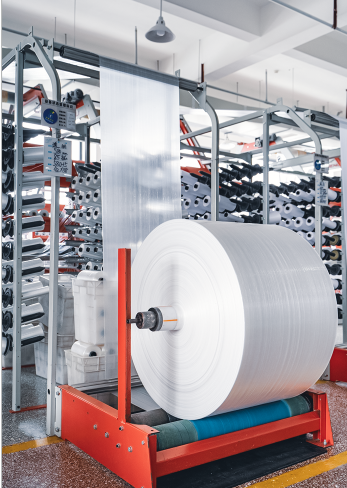
If you’re storing large quantities of seed or grain, FIBC bulk seed bags are one of today’s most effective, cost-saving, and space-efficient solutions.
Also known as Flexible Intermediate Bulk Containers (FIBCs), these woven polypropylene bags are designed to safely hold and transport dry, flowable products like seeds, grains, fertilizers, and feed. Unlike traditional options—such as metal silos or plastic drums—bulk seed bags offer superior handling, moisture resistance, and flexibility.
In this article, we’ll walk through eight proven benefits of using FIBC bulk grain bags for agricultural storage. Whether you’re storing soybeans, corn, wheat, or any seed-based product, this guide will help you understand why more businesses are turning to bulk storage bags for long-term protection and efficiency.
Bulk seed bags are highly customizable for different filling and discharging methods.
Depending on your system, you can choose from open-top or spout-top designs. Fill spouts are tailored to match your loading equipment, reducing spillage and speeding up operations. Bottom discharge spouts make unloading fast and clean—especially when used with automated systems or grain feeders.
This adaptability cuts down on labor time and product loss for businesses handling varied seed types or volumes.

Moisture is the enemy of grain and seed storage—FIBC bags offer a protective barrier against it.
Uncoated containers leave your harvest exposed to humidity and rain. Coated bulk grain bags, however, come with a protective polypropylene film and optional polyethylene liners. These added layers block moisture from seeping in, reducing the risk of mold, rot, and spoilage.
This feature is a must-have for regions with fluctuating weather or long storage periods.
Rodents, insects, and birds pose serious risks to exposed storage systems—but not to sealed bulk seed bags.
FIBC bags are made from woven polypropylene, a tough material that pests can’t chew through easily. Their sealed construction prevents contamination and allows you to isolate any affected bags—unlike large silos where a single infestation can ruin tons of product.
This improves food safety while cutting down on loss and cleaning costs.
When harvest time fills every inch of your storage facility, stackable bulk storage bags give you an edge.
Certain FIBC designs are built for vertical stacking, maximizing floor-to-ceiling capacity. When empty, these bags fold flat, saving room in off-seasons. Thanks to their stable design, they can be stacked without bulging or tipping, helping you organize seed varieties or grain batches efficiently.
This is especially helpful for seasonal operations or limited warehouse space.
Bulk seed bags offer a strong return on investment for both small and large-scale operations.
Compared to rigid bins or barrels, FIBCs are lightweight and economical to ship, store, and reuse. You don’t need forklifts or cranes for every move—most bags can be lifted with standard pallet jacks or trolleys.
Plus, you only pay for the capacity you use. This makes FIBC bags popular for agricultural businesses scaling up or diversifying storage.

Keeping seed or grain batches separate is easier and cleaner with individual bags.
The entire supply may be lost if one bulk grain storage unit becomes contaminated. But with FIBC bags, you can quarantine just one affected bag without impacting the others. Their easy-to-clean surfaces also reduce the risk of cross-contamination between uses.
This supports better hygiene practices in food and agri-processing environments.
One size doesn’t fit all—FIBC bulk storage bags can be tailored to your exact operation.
From UV protection to food-grade coatings, bags can be built to meet local regulations and storage needs. You can choose between single-use or multi-use models, sift-proof seams, dust-tight construction, and lifting loops designed for specific machinery.
This flexibility makes them suitable for farms, mills, grain co-ops, or international exporters.
Reusable, recyclable, and easy to store—FIBC bags are a smart environmental and operational choice.
Many bags can be reused multiple times with proper care, and woven polypropylene is fully recyclable in most industrial systems. Since they don’t require extensive infrastructure or cleaning systems like silos, they also reduce water, energy, and chemical usage.
Lower maintenance means lower costs and a smaller environmental footprint over time.
Bulk seed bags are large, woven containers used to store and transport dry, flowable materials like seeds and grains safely and efficiently.
They use polypropylene coatings and optional liners to block water and humidity from spoiling stored seeds or grains.
Yes. Polypropylene is hard for pests to chew through, and sealed designs prevent infestations from spreading.
Yes. Many FIBC models are designed to stack vertically, helping you save floor space during harvest.
Yes. Many bulk grain bags are built for multiple uses if handled properly and kept clean.
At XIFA Group, we’ve spent over 25 years helping global industries improve their packaging systems. From agriculture to construction, we specialize in custom polypropylene solutions, including high-quality FIBC bulk seed bags, bulk grain storage options, and BOPP laminated bags designed to protect and preserve your products.
We offer full customization, strict quality control, and global service support. Browse our full product catalog or contact us today for a quote tailored to your specific needs.




